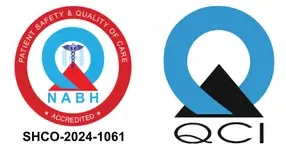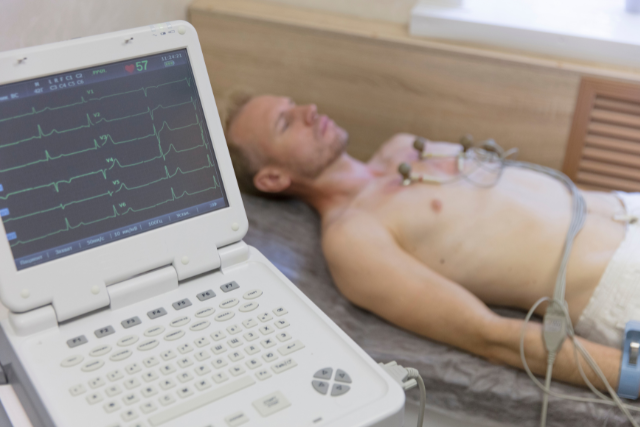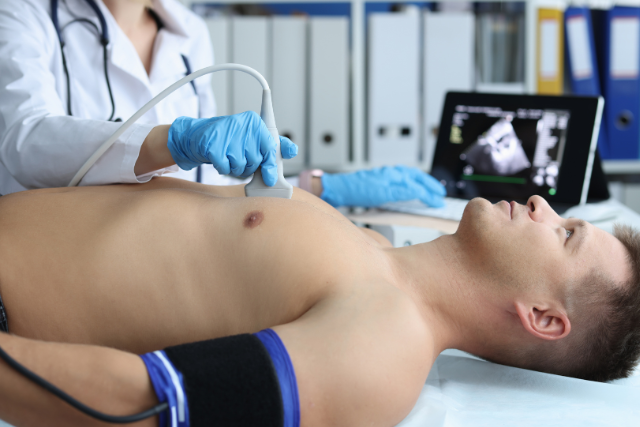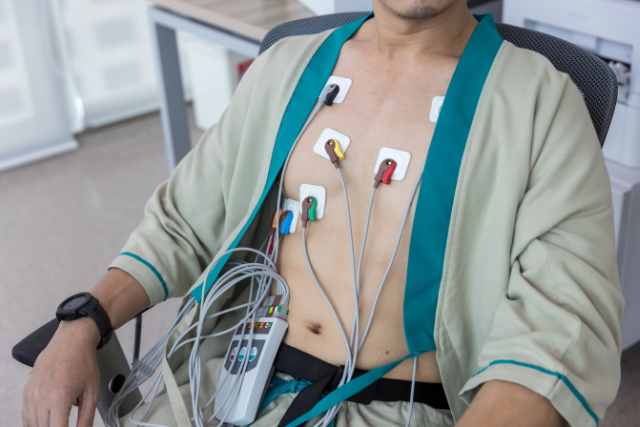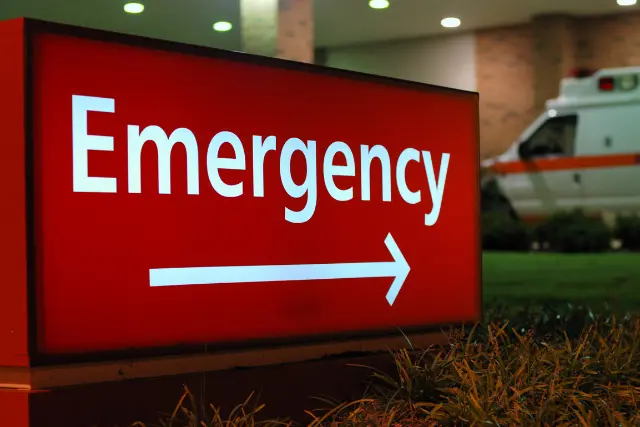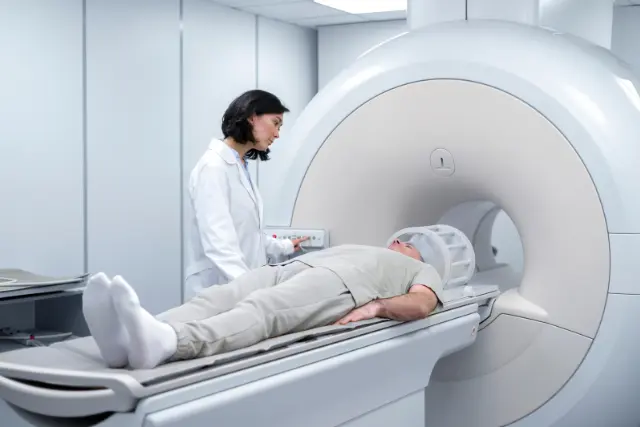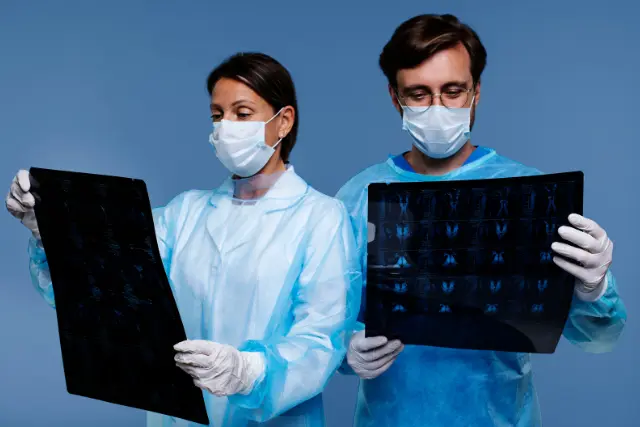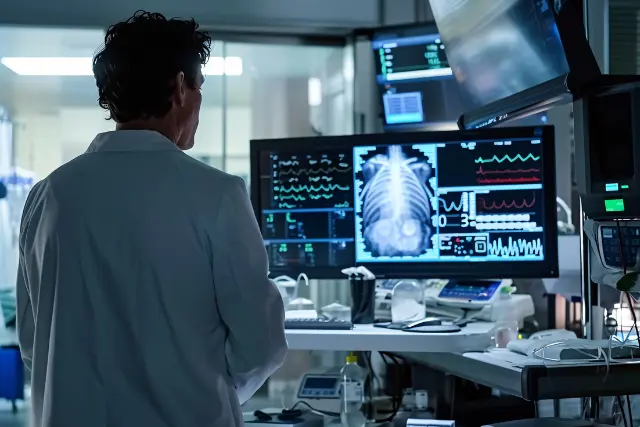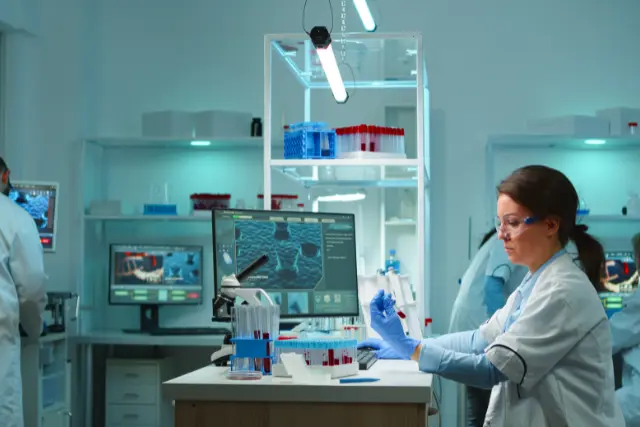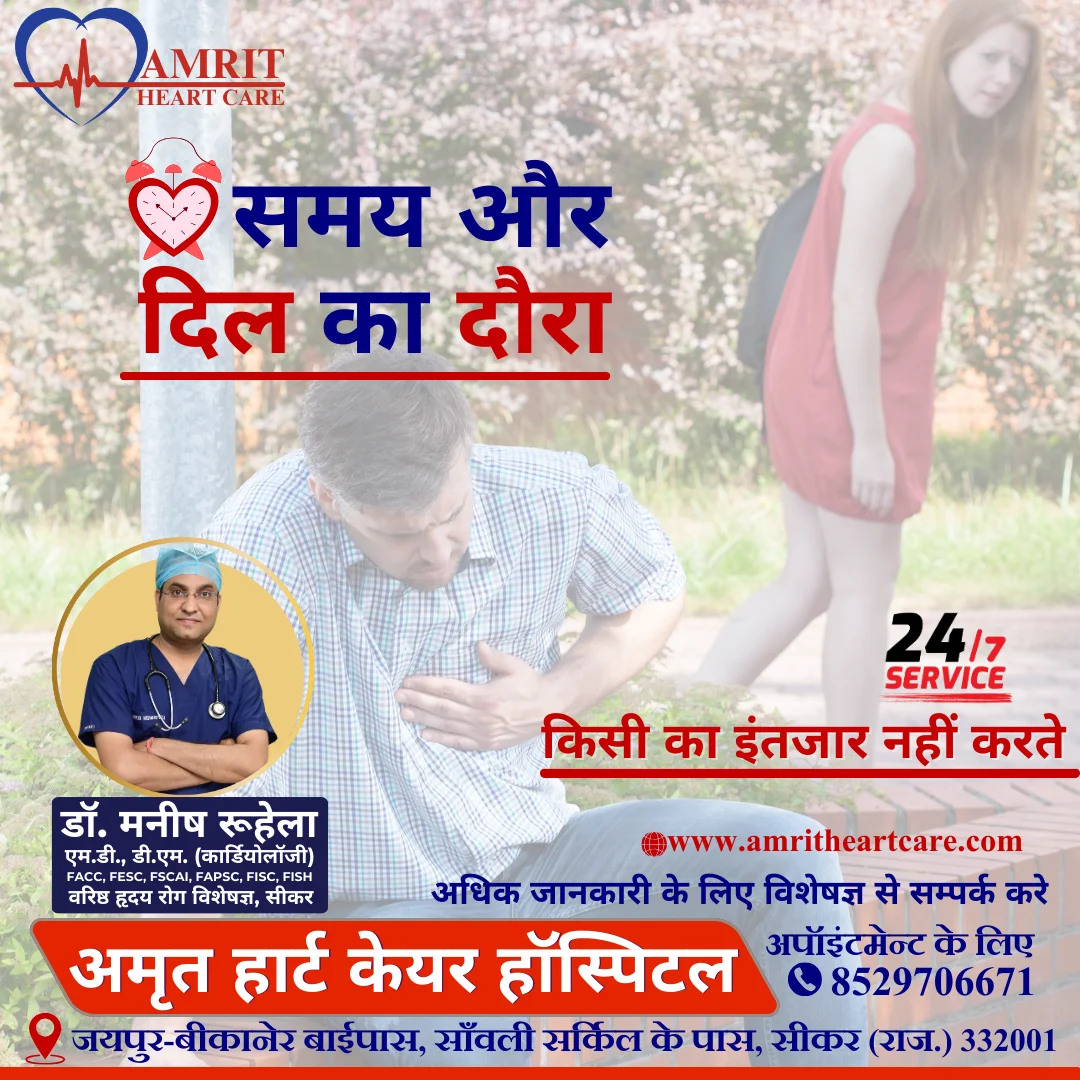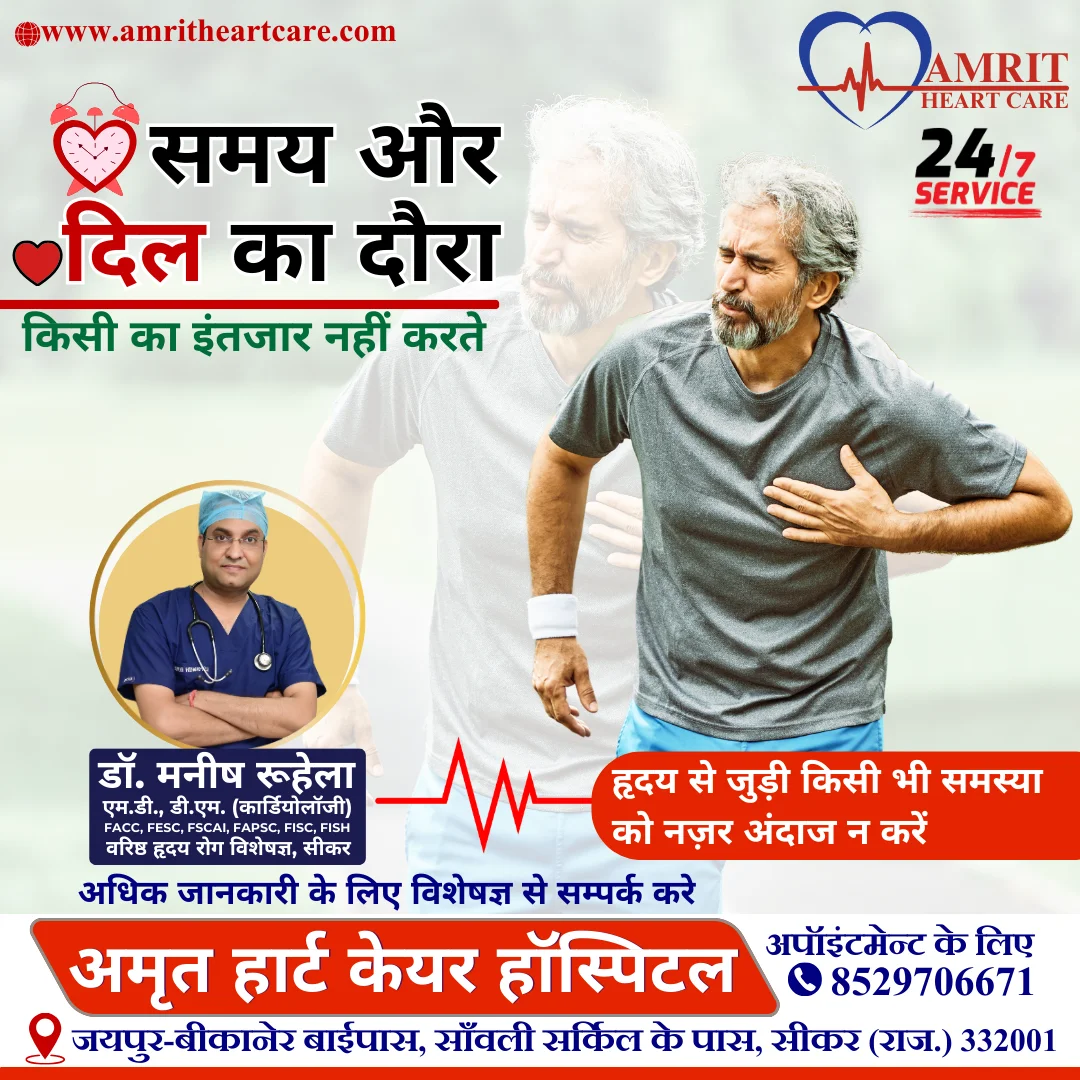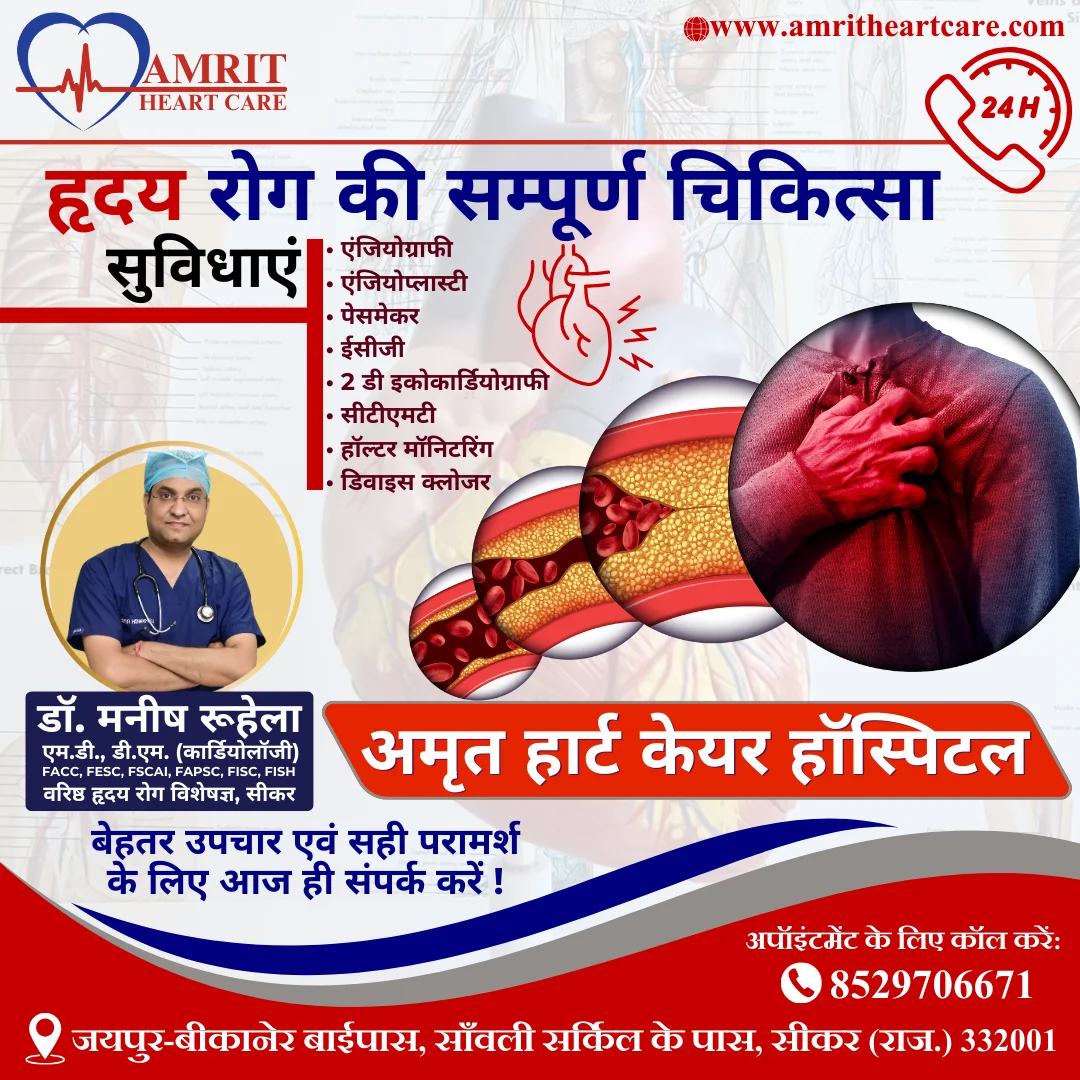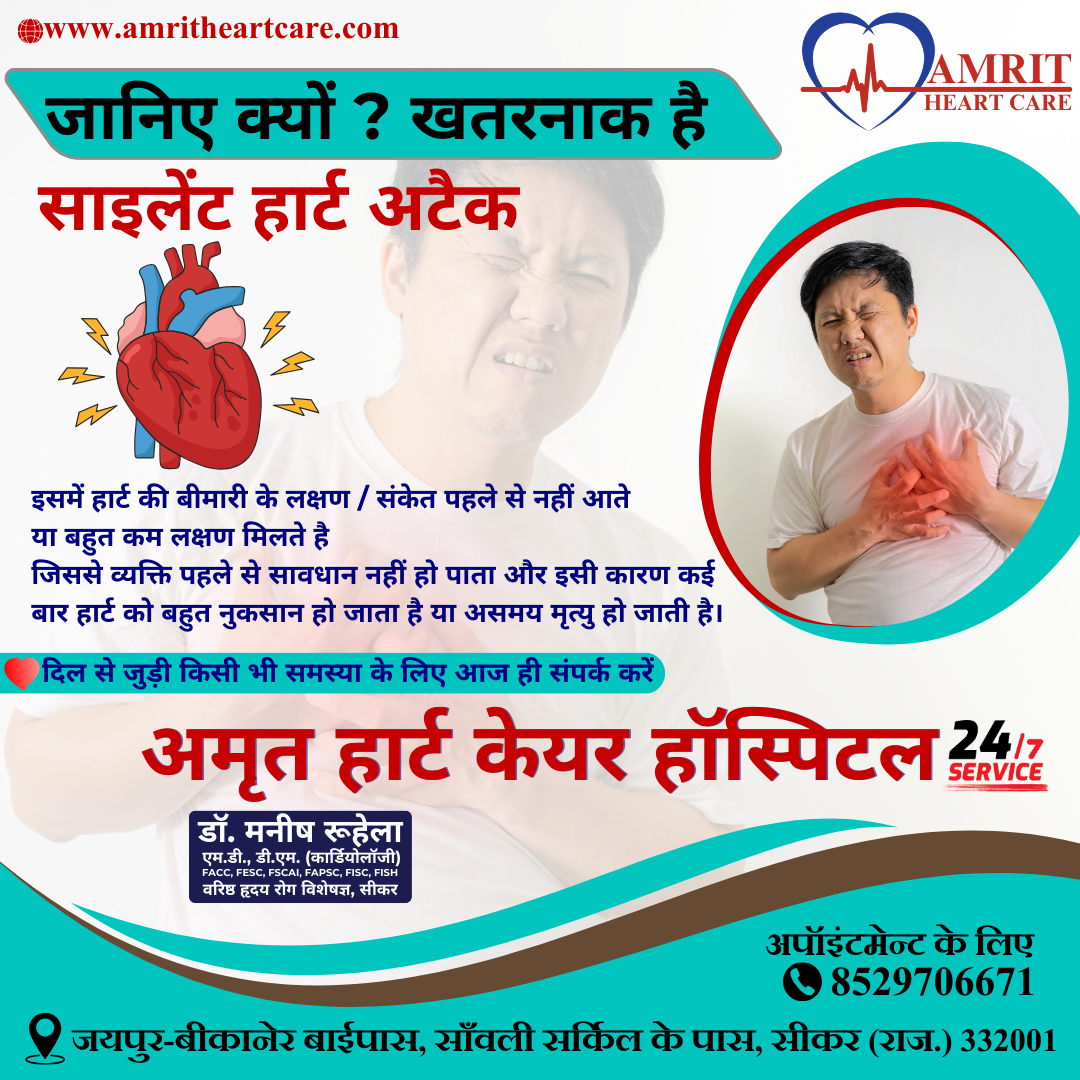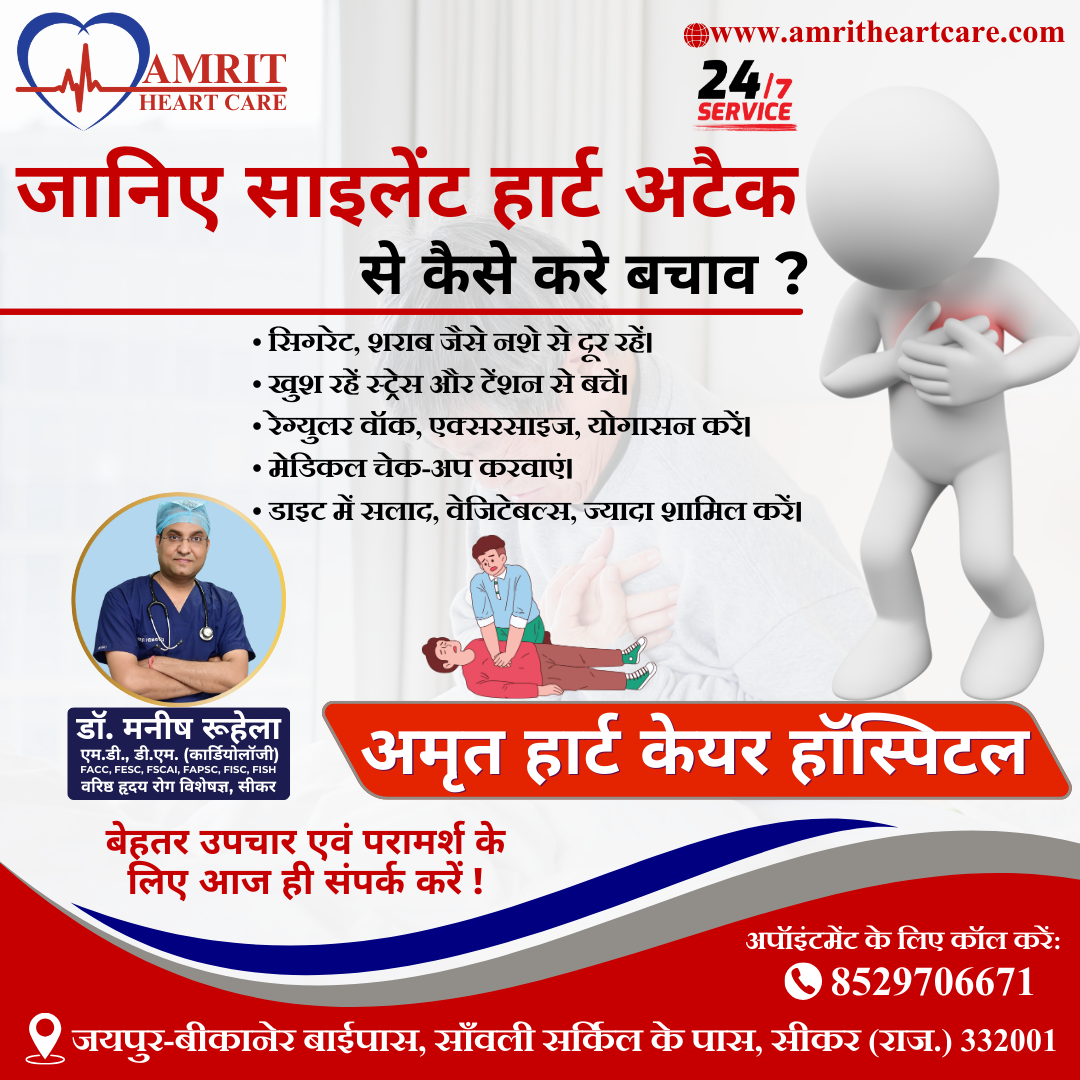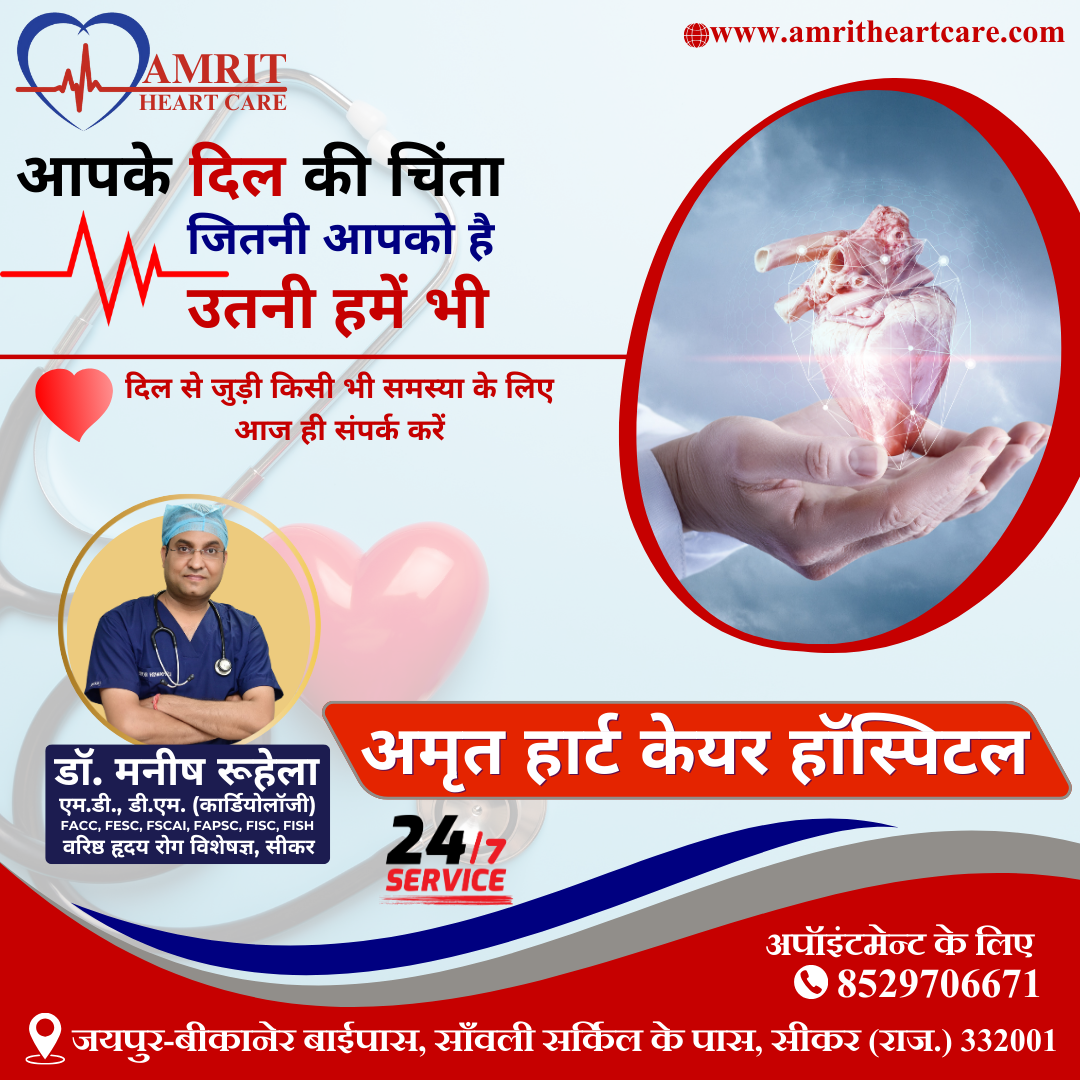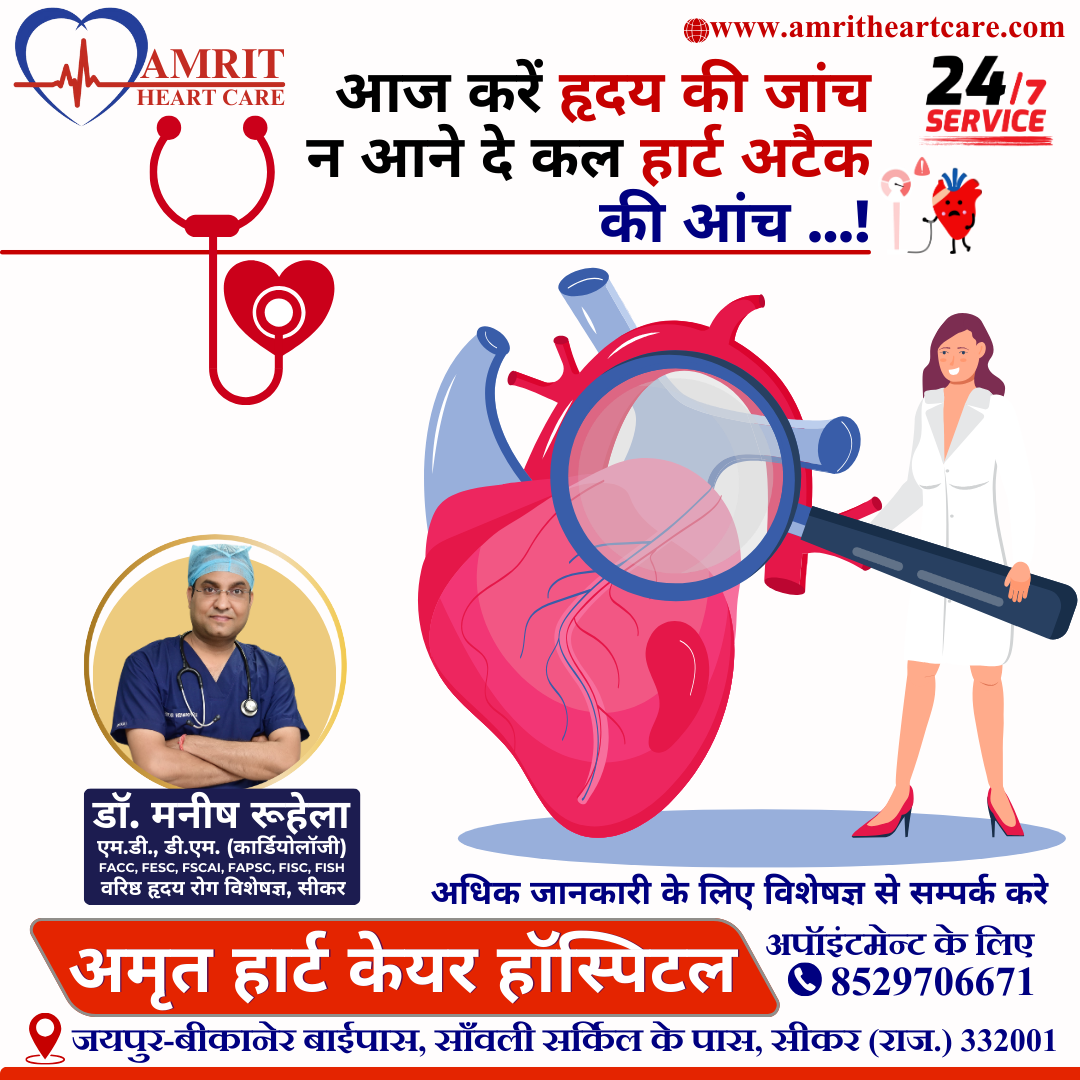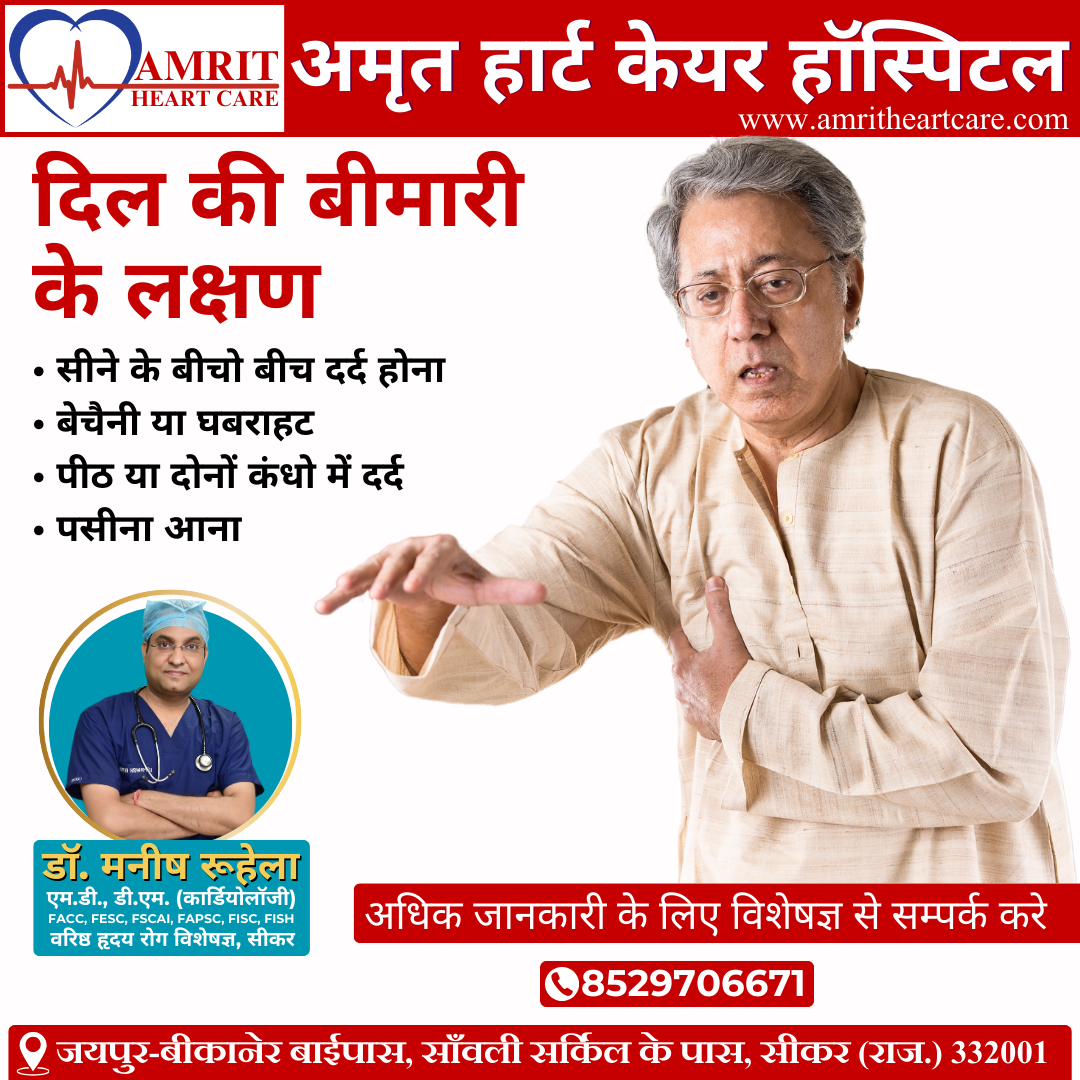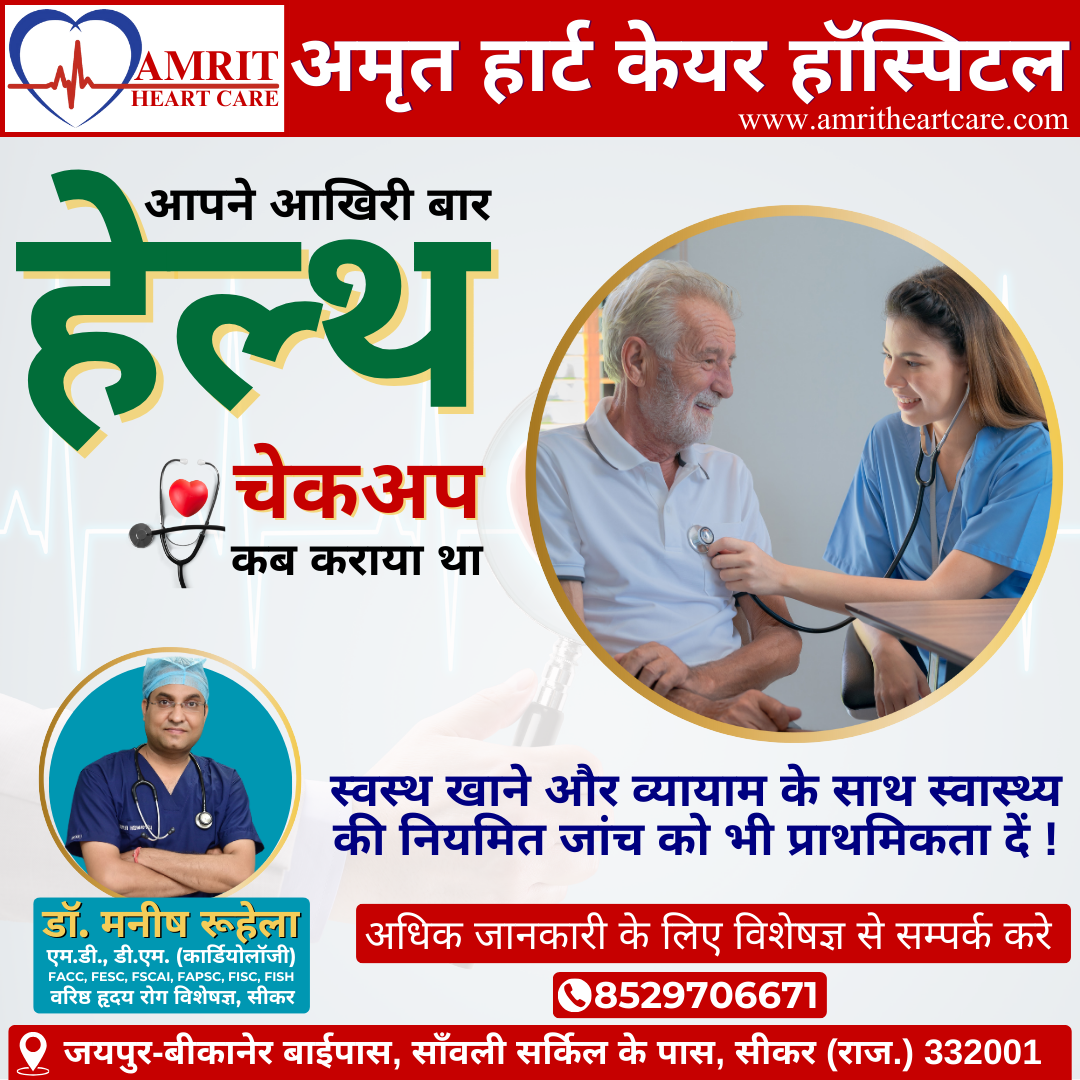








Amrit Heart Care Hospital
At Amrit Heart Care Hospital, we are dedicated to providing exceptional heart care with a personal touch. Located in the heart of Sikar, we have established ourselves as a leading healthcare institution specializing in comprehensive cardiac care. Our mission is to offer world-class heart care services, ensuring that every patient receives the highest standard of treatment and personalized attention.
Why Choose Us?
- Expert Cardiologists: Our doctors are renowned experts in their fields, offering the highest level of care.
- Personalized Treatment: We create tailored treatment plans based on individual patient needs.
- Cutting-Edge Technology: We use the latest medical equipment for precise diagnostics and treatment.
- Compassionate Care: Every patient receives personalized attention and care, focused on their unique needs.
- Affordable Services: We offer quality healthcare services at reasonable costs to make heart care accessible to everyone.
At Amrit Heart Care Hospital, we believe in a healthier, happier tomorrow, and we’re here to help you achieve it. Whether you’re seeking preventive care or require advanced heart surgery, we’re with you every step of the way.
For more information or to schedule a consultation, feel free to contact us. Your heart health is our priority!
Best Cardiologist Doctor in Sikar
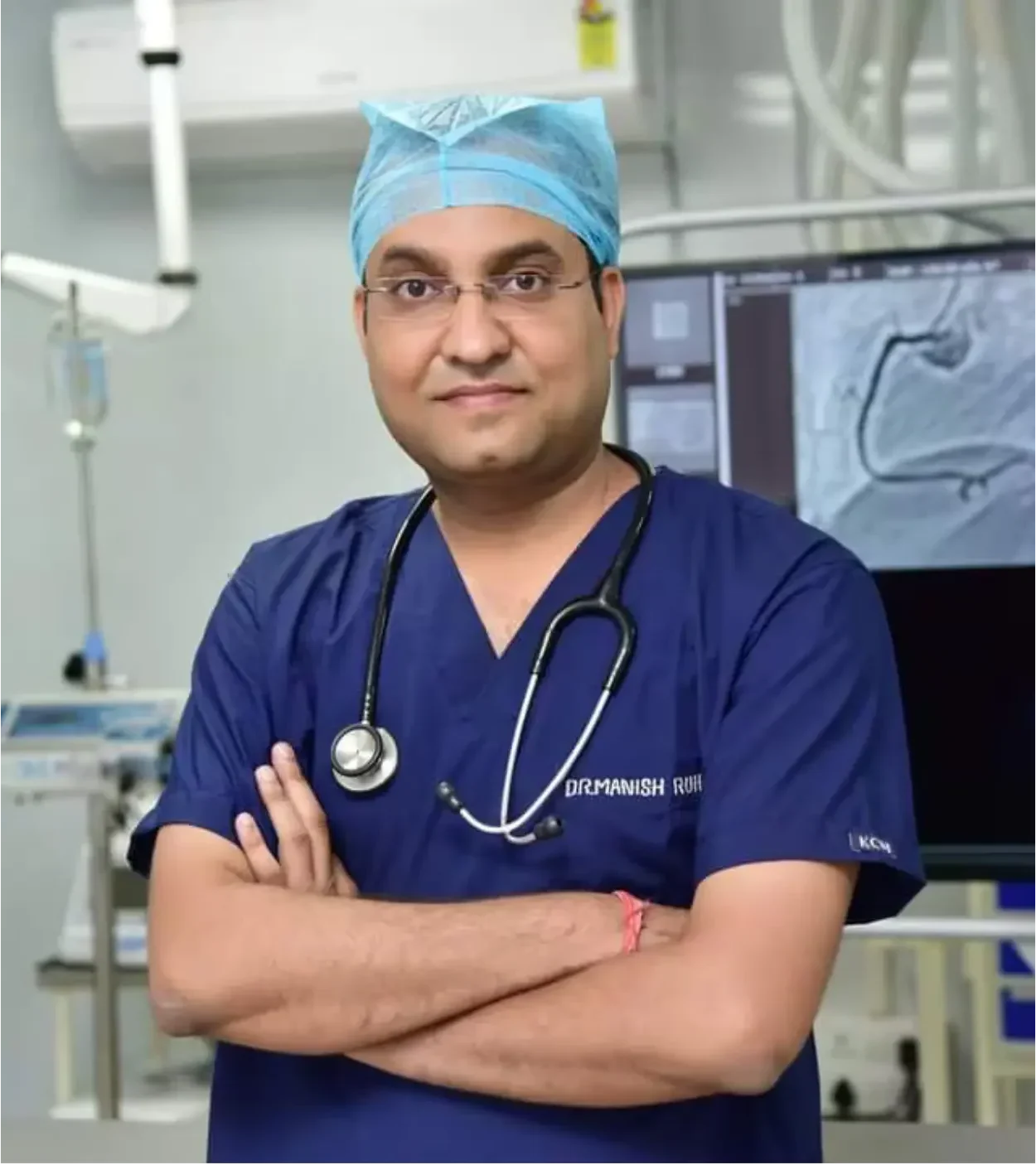
Dr. Manish Ruhela
M.B.B.S., M.D. (Medicine)
D.M. (Cardiology)
FACC, FESC, FSCAI, FAPSC, FISC, FISH
Senior Cardiologist, Sikar
Dr. Manish Ruhela, a native of Antroli village in Laxmangarh town, Sikar district, Rajasthan, is a distinguished cardiologist known for his dedication to both his profession and his community. With a career marked by academic excellence and a deep commitment to patient care, Dr. Ruhela has earned a reputation for his expertise and compassionate approach in the medical field.
Dr. Ruhela’s journey in medicine began in his hometown, but it was his quest for knowledge and expertise that took him across India. He has had the privilege of working in various renowned hospitals in Jaipur and Sikar, which shaped his professional growth. Despite the many lucrative opportunities that came his way, he chose Sikar to be his”KARAMBHOOMI,” dedicating his skills to serving his community.
“I was born in Sikar and had traveled across India for medical education, but a scene of longing brought me back to the city. The warmth from the people here and the unmatched culture is something that stays with me. I wanted to serve where my roots are deeply planted.”
Our Specialty

Cardiology
Amrit Heart Care stands as a beacon of hope and healing for individuals seeking specialized and comprehensive cardiac treatment. With a steadfast commitment to patient-centric

Interventional Cardiology
The hospital is home to state-of-the-art medical technology and a team of highly skilled professionals, all under the expert guidance of Dr. Manish Ruhela. The hospital is widely recognized

Non-Invasive Cardiology
At the core of the hospital’s success is its unwavering commitment to combining cutting-edge medical technology with a patient-centric approach. Under the expert leadership of its founder, Dr. Manish Ruhela

Paediatric Cardiology
it has earned a distinguished reputation for its specialized and compassionate Paediatric Cardiology department. The hospital’s mission is to provide world-class, accessible,

CTVS Treatment
A cardiologist, like Dr. Manish Ruhela (as indicated by his qualifications), diagnoses and treats heart conditions using medical and interventional (catheter-based) procedures.
Our Empanelments
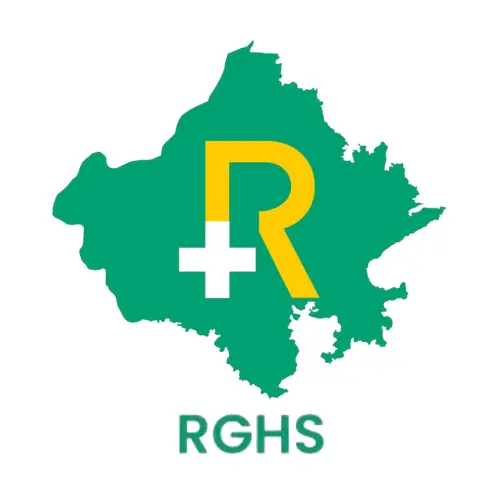
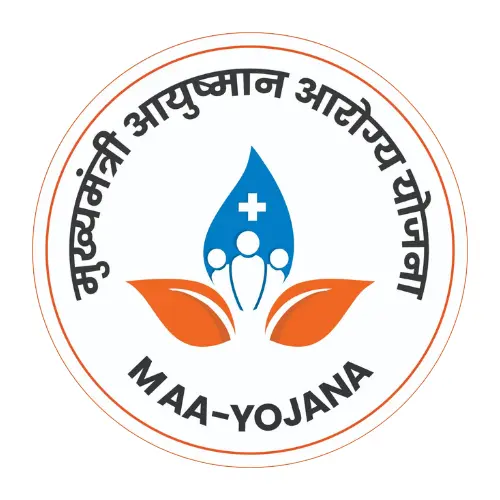
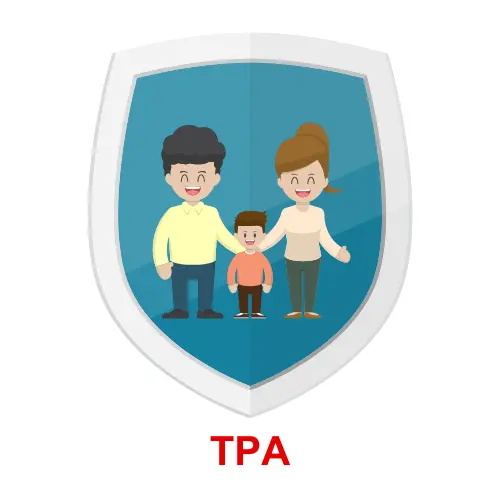
Our Services
Patient Reviews
EXCELLENTBased on 35 reviews
 AmitAd AmitAd2025-08-21Good 👍
AmitAd AmitAd2025-08-21Good 👍 Pyarelal Mandia2025-04-03Best👍
Pyarelal Mandia2025-04-03Best👍 Sitaram Kumawat2025-03-28Dr manish ji cardiologist best dr and suggest very good for heart health
Sitaram Kumawat2025-03-28Dr manish ji cardiologist best dr and suggest very good for heart health Prithvi Singh Choudhary2024-12-18A good place for heart patients.
Prithvi Singh Choudhary2024-12-18A good place for heart patients.
Book An Appointment

Hospital FAQ
There are various potential causes of heart block, also known as atrioventricular (AV) block. Age-related degeneration is a common cause, as the conduction system of the heart can degenerate with age.
Heart attacks, problems with the cardiac muscle, and heart valve abnormalities are examples of structural heart ailments that can disrupt normal conduction pathways. Certain drugs can disrupt the electrical impulses of the heart.
Infections, such as myocarditis and endocarditis, can potentially impair the conduction system of the heart. Lupus and rheumatoid arthritis are examples of autoimmune disorders that can cause inflammation and harm to the electrical system.
Congenital cardiac abnormalities can alter normal conduction routes from birth. Electrolyte abnormalities, hereditary diseases, cardiac surgery, heart tumours, and certain metabolic disorders are also possible causes.
What causes heart attacks in young people is a variety of factors, including genetic predisposition, underlying heart conditions, substance abuse, smoking, high blood pressure, diabetes, high cholesterol, obesity, sedentary lifestyle, excessive stress, and certain autoimmune diseases.
Heart attack symptoms include pain in the chest radiating to the left arm,
ST-segment elevation myocardial infarction (STEMI- a total artery blockage) and non-ST-segment elevation myocardial infarction (NSTEMI- partial blockage of a coronary artery) are the types of heart attacks
Although there are many different heart attack symptoms, the most typical ones include chest pain or discomfort, shortness of breath, pain in the arms, neck, jaw, or back, nausea, lightheadedness, cold sweats, and exhaustion.
If you’re thinking about how to prevent heart attacks, regular exercise, a balanced diet low in saturated and trans fats, quitting smoking, managing stress, controlling blood pressure and cholesterol levels, maintaining a healthy weight, and avoiding illicit drug use are all recommended.
The most common cause of ischemic heart disease (IHD) is atherosclerosis, which is a build-up of plaque in the arterial walls made up of cholesterol, fat, and other chemicals. This plaque inhibits blood flow, resulting in decreased oxygen delivery to the heart and a variety of symptoms.
Chest discomfort or angina, shortness of breath, exhaustion, palpitations, and, in extreme situations, a heart attack are all symptoms of IHD. Smoking, high blood pressure, high cholesterol, diabetes, obesity, a sedentary lifestyle, and a family history of heart disease are all risk factors.
IHD treatment options attempt to alleviate symptoms, lower the risk of complications, and enhance overall heart health. They include dietary changes, regular exercise, weight management, and smoking cessation, as well as drugs and surgical treatments (angioplasty, stenting, and bypass surgery) to enhance blood flow and restore function.
Yes, it is true that stress and anxiety can cause heart problems or worsening of cardiac issues. Prolonged or chronic stress can raise levels of stress hormones such as cortisol and adrenaline, which can have an impact on the cardiovascular system. It may elevate blood pressure, pulse rate, and inflammation, all of which can put strain on the heart.
Furthermore, stress and worry can cause or worsen arrhythmias, angina (chest discomfort), and even heart attacks in vulnerable people. Furthermore, stress-related behaviors such as overeating, smoking, or excessive alcohol use can be detrimental to heart health. As a result, it is critical to properly manage stress and seek professional treatment if stress and anxiety are negatively harming your general well-being and heart health.
There are many, but 10 rare heart diseases include:
- Brugada syndrome is a hereditary condition that affects the electrical system of the heart, increasing the risk of severe arrhythmias.
- Hypertrophic cardiomyopathy is a disorder characterised by abnormal thickening of the heart muscle, making it difficult for the heart to adequately pump blood.
- Takotsubo cardiomyopathy, sometimes known as “broken heart syndrome,” is caused by extreme emotional or physical stress and results in transient heart muscle weakening.
- Arrhythmogenic right ventricular dysplasia is a disorder in which the right ventricle’s heart muscle is replaced by fatty or fibrous tissue, resulting in irregular cardiac rhythms.
- Restrictive cardiomyopathy is an uncommon illness in which the heart stiffens and cannot relax effectively, impairing its capacity to appropriately fill with blood.
- Cardiomyopathy without compaction is excessive trabeculation (spongy tissue) in the heart muscle, which can lead to heart failure.
- The left ventricle of the heart is notably affected by left ventricular non-compaction.
- Arrhythmogenic left ventricular cardiomyopathy in which defective heart muscle affects the left ventricle, increasing the risk of arrhythmias.
- Loeys-Dietz syndrome damages connective tissues, increasing the incidence of aortic aneurysms.
- Danon disease, caused by a genetic mutation, is characterized by weakening heart and skeletal muscles, as well as intellectual incapacity.
Heart failure is a condition in which the heart’s capacity to efficiently pump blood is reduced.
There are two forms of heart failure: systolic heart failure and diastolic heart failure.
Systolic Heart Failure: In this type of condition, the heart muscle weakens and fails to contract efficiently, resulting in insufficient blood pumping to fulfill the body’s demands.
Heart attacks, which damage the heart muscle, and coronary artery disease, which narrows or stops the blood channels feeding the heart, are the most prevalent causes.
Diastolic heart failure occurs when the heart muscle stiffens and loses its capacity to relax appropriately during the filling phase. Diastolic heart failure can be exacerbated by conditions such as high blood pressure, diabetes, and certain heart disorders.
The main causes of heart failure include coronary artery disease, high blood pressure, heart valve problems, heart muscle diseases, congenital heart defects, infections, thyroid disorders, alcohol abuse, and certain medications.
The types and causes of heart failure will determine the investigations and type of treatment
A minor heart block, also known as a first-degree atrioventricular (AV) block, is a slight conduction abnormality in the electrical impulses that regulate the heartbeat.
The signs of a minor heart blockage are often not very obvious and may be discovered by chance during a regular electrocardiogram (ECG) or other diagnostic procedures.
The heartbeat may be slower than usual, with a heart rate falling below the normal range of 60 to 100 beats per minute. The cardiac beat, however, stays regular. Some people may develop minor weariness or impaired exercise tolerance. This might be attributed to the heart’s diminished effectiveness in carrying electrical signals, albeit the impact is often minor.
Some persons who have a first-degree AV block may have palpitations or chest pain.
Pediatric hospitals are more commonly opening specialty intensive care units (ICU) that specialize in the care of infants, children and adults with heart problems. Cardiac ICUs are staffed by intensive care physicians, cardiologists, nurse practitioners, respiratory therapists and nurses with special expertise in the care of neonatal, pediatric and adult congenital heart problems. The cardiac ICU is often a different ICU than the pediatric ICU (PICU) or neonatal ICU (NICU). Patients in the cardiac ICU can range from newborns with newly diagnosed heart disease to adults with congenital heart disease.
A murmur is simply a sound or noise a nurse, doctor or advanced practice provider (nurse practitioner or physician assistant) hears during a checkup or physical examination. Some heart murmurs are caused by heart abnormalities, such as holes or abnormal valves. However, many heart murmurs are “innocent,” “functional” or benign. In fact, approximately 50% of all children with normal hearts can have an innocent murmur heard intermittently. Innocent murmurs are caused by blood flow through the normal heart. Therefore, many heart murmurs are normal and benign. If your primary care provider wants the murmur evaluated further referral to a cardiologist can help sort out if the sound is normal or needs more testing or work up.
Passing out or fainting or syncope is relatively common. Common causes are standing upright or positional changes such as going from sitting to standing. Common fainting – known as vasodepressor or vasovagal syncope – results from an imbalance of heart rate, blood pressure and blood flow to the head causing brief loss of consciousness. Typical scenarios for common fainting are: standing in line, standing in church, standing up in the shower and after using the toilet. Rarely a serious heart problem causes fainting. Fainting during sports or intense exercise is a different story and may be caused by a heart problem. Fainting during sports or intense exercise should be evaluated by a cardiologist. To prevent common fainting episodes increased fluids, extra salt in the diet and avoiding caffeine usually help.

